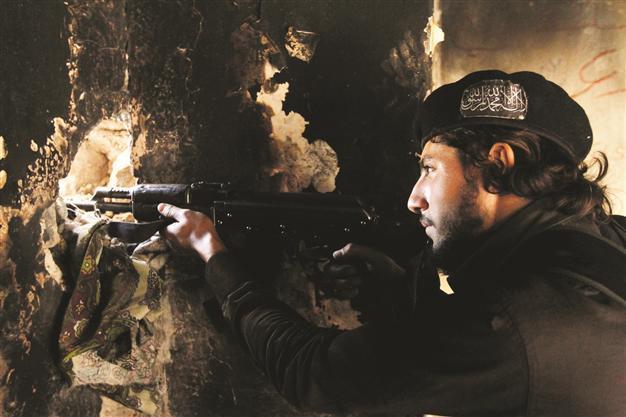Syria opposition draws up transition road map
BEIRUT

A Free Syrian Army rebel aims his weapon through a hole in a wall as he takes position in al-Jdeideh neighborhood in the old city of Aleppo. REUTERS photo
Syrian opposition activists, including National Coalition members, have drawn up a road map to achieve national reconciliation and justice for “all of Syria’s victims,” a statement said yesterday.The road map is to be presented in full in Istanbul today, in the presence of National Coalition chief Ahmed Jarba, but has not been officially endorsed by the key opposition group. “National reconciliation will be achieved through a long transitional justice process in which justice is assured for all of Syria’s victims,” said the statement outlining the road map.
The proposal also calls for disarming and restructuring Syrian security forces to uproot “corrupt officials.”
“All armed groups will be disarmed, demobilized and reintegrated into Syrian society.” The road map also lays out plans for the country’s political system after the fall of the Syrian regime, calling for a “hybrid presidential/parliamentary system.” It proposes using the country’s 1950 constitution as the basis for a new charter, with an elected constitutional assembly mandated to decide on modifications.
Peace conference likely in October
Syria’s constitution privileges the legislature over the executive and states that the head of state must be a Muslim. The group behind the proposal, Syrian Expert House, includes some 300 activists, lawyers and members of the opposition National Coalition and Syrian National Council. Defected government officials and rebel commanders also participated in the drafting process, the group said.
Meanwhile, a Russian diplomat said yesterday Moscow wants a Syria peace conference to be held as soon as possible but it is unlikely to go ahead before October because there is a busy diplomatic schedule before then.
Russian Deputy Foreign Minister Gennady Gatilov said more talks were expected at the end of August on preparing the so-called Geneva-2 conference, aimed at bringing Syrian rebels and President Bashar al-Assad’s government together.
“It (the peace conference) is unlikely to happen in September because there are different events, including the ‘ministerial week’ at the U.N. General Assembly,” Gatilov told Interfax news agency. “We are for it happening as soon as possible, but we need to be realistic about circumstances which could effect the forum.”
Russian and U.S. officials agreed last week that the long-delayed conference should take place as soon as possible, but offered no concrete plan to bring the warring sides to the table. Washington and Moscow said initially they would try to hold the conference by the end of May. But the date keeps slipping, partly because the rebels are split and cannot decide who should represent them.
U.N. Arab League peace mediator Lakhdar Brahimi, who held talks with senior U.S. and Russian officials in Geneva, has ruled out a peace conference before August. Battlefield gains by al-Assad have added to questions about when and even whether it will take place. Gatilov also said Russia was still keen on including Iran in the talks, a proposal that Washington has not supported.
















